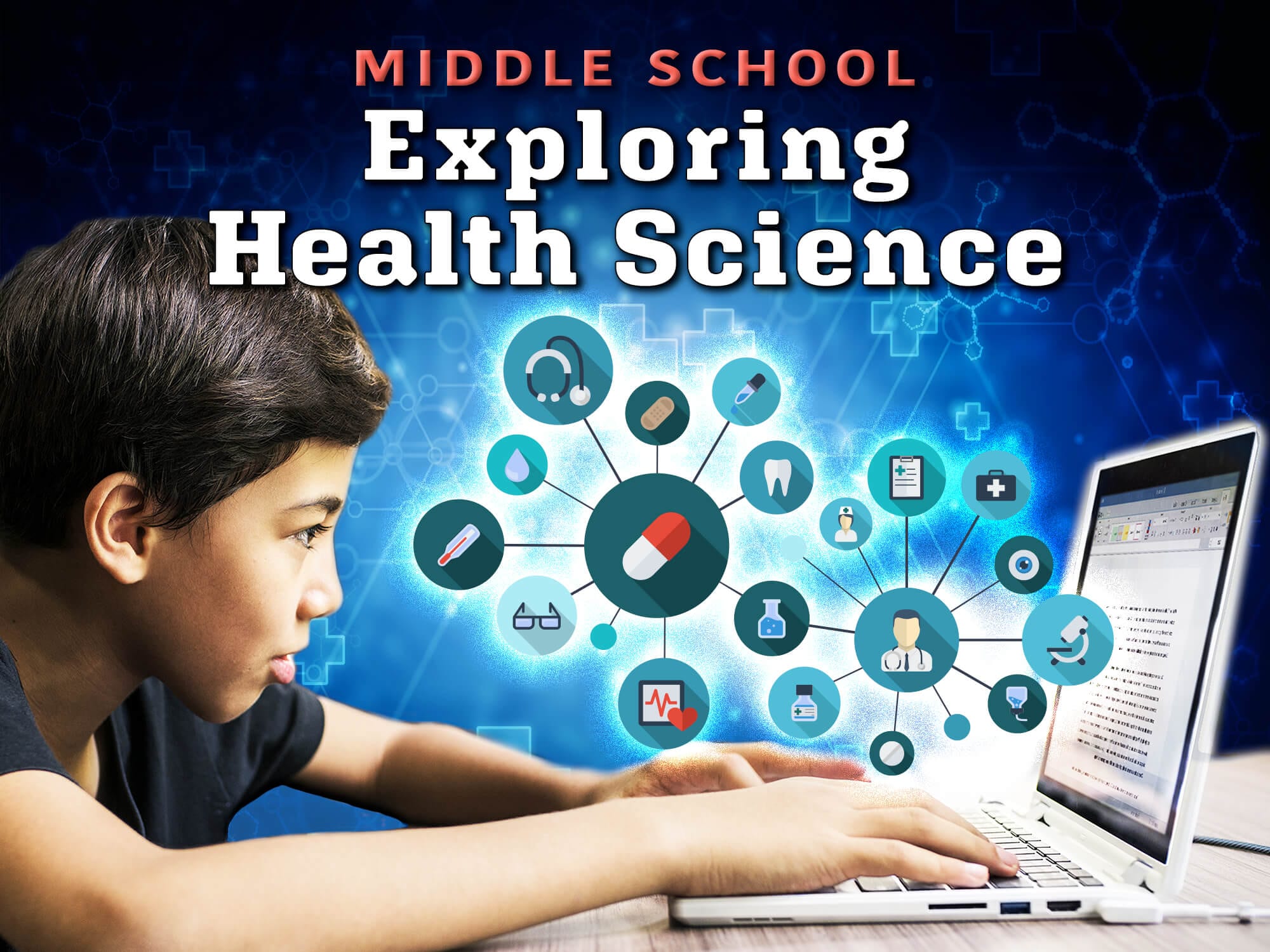
Middle School Exploring Health Science
Where do healthcare workers spend their days? What do they really do? From cruise ships to sports arenas, you can find healthcare workers in many places that you might not expect. Explore this field, including what it would be like to work in a medical lab. Learn what it takes to keep you and your patients safe, and begin to learn about the human body and basic first-aid.
Units at a Glance
Unit 1: Working with Blood and Guts: Careers in the Healthcare Field
Where do healthcare workers spend their days? What do they really do? From cruise ships to sports arenas, you can find healthcare workers in lots of places that you might not expect. We will be learning about a handful of different medical professions, their salaries, educational requirements, and job responsibilities. We’ll also take a look at the different career pathways that are found in the medical field so you can determine which one might be the most interesting to you!
What will you learn in this unit?
- Compare and contrast the five health sciences pathways
- Discuss health science occupations including information on job responsibilities, educational requirements, and salary
- Explain some of the basic skills used in the healthcare profession such as ABO blood typing, vision testing, and visualizing X-rays
- Correctly use and define common medical terminology
Unit 2: Ethical Patient Interaction
As a medical professional, you will face ethical and moral dilemmas. Should you tell a patient’s brother their diagnosis? What is the kindest way to break bad news? Can a sick patient refuse treatment? Thinking through these types of medical dilemmas is important. You’ll also learn about the rules, laws, and etiquette that govern patient interactions. Communicating well can be tough. But communicating in the medical community can be even tougher. You’ll need these techniques to succeed!
What will you learn in this unit?
- Describe patient’s rights including confidentiality, the right to refuse treatment, and the right to understand medical conditions and treatment
- Read and interpret a Safety Data Sheet (SDS)
- Explain the role of OSHA in the medical field
- Demonstrate interpersonal communication skills such as active listening
- Identify the role of verbal, non-verbal, and written communication within the healthcare field
Unit 3: The Most Important Care You Can Receive: Self Care
From handwashing to wearing PPE, healthcare workers have a variety of ways to keep themselves safe. But what does everyone else do? How can you keep yourself safe and healthy? And what happens when you do get sick? Learning about your body and the ways that diseases are spread will help you make sense of all these topics as well as lots of other illnesses from the common cold to heart disease.
What will you learn in this unit?
- Describe types of diets and the impact they have on health
- Demonstrate healthcare safety measures such as handwashing, donning and doffing PPE, and proper spill cleanup technique
- Analyze chains of infection and modes of disease transmission
- Discuss major scientific advancements and their impact on health care
Unit 4: In the Medical Lab: Investigating Clues to Solve Medical Mysteries
Do you like solving puzzles? Do you enjoy putting clues together to solve mysteries? If so, you just might have what it takes to work in a medical laboratory. Professionals in this field use up-to-date technology to uncover causes of disease and how to treat it. If you’ve always wondered how medicines are developed and who makes sure that they are safe, you’re about to find out! Medical workers and scientists are involved in every step of the process, and there are always new things to learn about and discover.
What will you learn in this unit?
- Describe the scientific process and its importance
- Compare and contrast viruses, bacteria, and fungi
- Discuss safety precautions for laboratory workers
- Identify the role of government agencies in protecting public health
Unit 5: Organizing the Human Body: From Cells to Organ Systems
Healthcare workers have to make quick decisions all the time, and their choices can impact whether a patient lives or dies. To make these types of decisions, they have to understand how the body is organized. They also need to know how to gather and understand all types of health information. Using this information, they can make diagnoses, treat diseases, and perform medical procedures. But ultimately, their goal is to help their patients lead longer, healthier lives.
What will you learn in this unit?
- Describe the organization of the human body
- List organ systems in the body and explain their functions
- Compare and contrast invasive and non-invasive procedures
- Explain common medical tests and equipment related to the cardiac and respiratory systems
Unit 6: What Every Medical Worker Should Know!
Have you ever witnessed a medical emergency? What did you do? Hopefully you or another bystander was able to call 9-1-1 and provide first aid until emergency medical responders could arrive. Then the patient was probably whisked away to a hospital or doctor’s office for additional medical care. Being able to give first aid is just the first step in a chain of medical care to help the patient survive and get better. We will be looking at each step in this chain, the data that is collected, and the decisions that are made. Normally, these decisions help the patient get better, but we will also look at two case studies where medical mistakes were made. Then we will identify how those mistakes could have been prevented.
What will you learn in this unit?
- Discuss the importance of body mechanics and proper patient transfer protocol in the healthcare environment
- Apply mathematical skills to solve healthcare-related problems
- Identify the cause and effect of medical errors and provide possible solutions
- Demonstrate basic first-aid skills including choking maneuvers, CPR, and wound care
Required Materials
Physical
- Video recording device
- Household props (will vary)
- Various household items like cloth mask, cotton gloves, cleaner or antibacterial wipes
- Rubber band, belt or fabric
- Small square of paper or cotton ball
- Mechanical pencil
- Container for vial
- Friend or family member
- Graph paper
- Colored pencils
- Chair with armrests
- Additional chair
Software
- Slide presentation software
- Word processing software
Optional
- Paper
- Colored pencils
- Various household props
- Stuffed animal or doll



